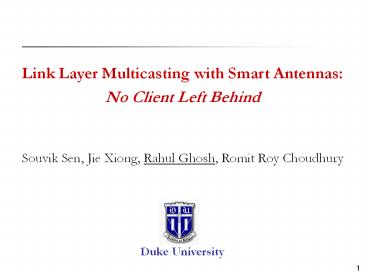qual PowerPoint PPT Presentation
Title: qual
1
Link Layer Multicasting with Smart Antennas No
Client Left Behind Souvik Sen, Jie Xiong,
Rahul Ghosh, Romit Roy Choudhury Duke
University
2
Wireless Multicast Use-Cases
- Widely used service
- Interactive classrooms, Smart home, Airports
- MobiTV, Vcast, MediaFlo
- Single transmission to reach all clients
3
Motivation
- Today
- Multicast rate dictated by rate of weakest
client (1 Mbps) - Inefficient channel utilization
- Goal
- Improve multicast throughput
- Uphold same reliability
1 Mbps
5.5 Mbps
11 Mbps
4
Problem is Non-Trivial
- Scattered clients, different channel conditions
- Time-varying wireless channel
- Absence of per-packet feedback
1 Mbps
5.5 Mbps
11 Mbps
5
Solution also Non-Trivial
11 Mbps
1 Mbps
- Low rate transmission leads to lower throughput
- High rate transmission leads lower fairness
Past research mostly assume omnidirectional
antennas
6
Problem Validation through Measurements
7
Measurements in Duke Campus
8
Measurements in Duke Campus
AP
Transmission _at_ 1 Mbps
Clients
9
Measurements in Duke Campus
Transmission _at_ 2 Mbps
10
Measurements in Duke Campus
Transmission _at_ 5.5 Mbps
11
Measurements in Duke Campus
Transmission _at_ 11 Mbps
12
Measurements in Duke Campus
Delivery Ratio
Client index
Topologies are characterized by very few weak
clients
13
Reality
shadow regions
Weak clients tend to be clustered over small
regions
14
Intuition
15
Intuition
16
Intuition
11 Mbps Omni
17
Intuition
18
Intuition
4 Mbps Directional
11 Mbps Omni
1 Mbps Omni
19
Intuition to Reality
Few directional transmissions to cover few clients
20
Challenges
- Partitioning the client set with optimal omni
and directional rates - Estimation of wireless channel
- Providing a guaranteed packet delivery ratio
21
Proposed Protocol - BeamCast
Link Quality Estimator
BeamCast
Retransmission Manager
Multicast Scheduler
22
Link Quality Estimator (LQE)
- How to estimate the bottleneck rate for each
client? - Bottleneck rate Max. rate to support a given
delivery ratio - AP takes feedback from the clients periodically
- LQE creates a database using the feedback
- Bottleneck rates are updated by using this
database
23
Link Quality Estimator (LQE)
- Theoretical relationship between delivery ratio
(DR) and SNR
24
Multicast Scheduler (MS)
- How to determine optimal transmission schedule?
- A schedule 1 omni many directional
transmissions - Optimal schedule Schedule with minimum
transmission time - MS extracts distinct client data rates from
feedback - We assume,
- Beamforming rate F x Omnidirectional rate
F gt 1
25
Multicast Scheduler (MS)
How to determine optimal transmission rate for
each beam?
26
Multicast Scheduler (MS)
- Problem becomes harder with overlapping beams
27
Multicast Scheduler (MS)
- Problem becomes harder with overlapping beams
28
Multicast Scheduler (MS)
- Problem becomes harder with overlapping beams
29
Multicast Scheduler (MS)
- Problem becomes harder with overlapping beams
Dynamic Programming used to solve the problem
30
Retransmission Manager
- To cope with packet loss
- Receives lost packet information from the
clients periodically - Retransmits a subset of lost packets
- Choose packets using a simple heuristic
31
Evaluation
- Qualnet simulation
- Comparison with Feedback enabled 802.11
- Main Parameters
- Dynamic channels Rayleigh, Rician fading
External interference - Antenna beamwidth 45o, 60o, 90o
- Factor of rate improvement with beamforming 3, 4
- Metrics Throughput, Delivery Ratio, Fairness
- Application specified Minimum Delivery Ratio
90
32
Multicast Throughput
BeamCast performs better with increasing Fading !
33
Multicast Throughput
Throughput decreases with increase in client
density
34
Delivery Ratio
Increased delivery ratio for all clients, hence,
No Client Left Behind
35
Limitations
- Switching delay has been assumed to be negligible
- Rate reduction for both fading and interference
- Requires link layer loss discrimination
- Focuses on one-AP-many-clients scenario
- Multi-AP environment will require coordination
- Ideas can be extended to EWLAN architectures
- Controller assisted scheduling better
interference mitigation
36
Conclusions
- Opportunistic beamforming for wireless
multicasting - Multiple high rate directional vs. a single omni
transmission - Rate estimation, scheduling and retransmission to
achieve high throughput at a specified delivery
ratio - A potential tool for next generation wireless
multicast
37
Thanks !
38
Questions or Thoughts ??
39
Smart Antennas in Multicast
- Jaikeo et. al talk about multicasting in ad-hoc
networks - Assume multi-beam antenna model
- Provide an analysis for collision probability
- Do not consider asymmetry in transmission range
- Ge et. al characterize optimal transmission
rates - -Discuss throughput and stability tradeoff
- Papathanasiou et. al discuss multicast in IEEE
802.11n based network - Minimize total Tx power but still provides a
guaranteed SNR - Assume perfect channel state information is
available
40
System Settings
- We assume IEEE 802.11 based WLANs
- Beamforming antennas are mounted on access
points (AP) - Clients are equipped with simple omnidirectional
antennas - Clients are scattered around AP and remain
stationary - Surrounding is characterized by wireless
multipath and shadowing effects
41
System Settings
- Antenna Model
A
- Improvement in data rate is possible
- C W log2 (1 SINR)
Higher with beamforming antennas
42
Fairness
- Jains Fairness Index
Both schemes are comparable
43
Title
Body
44
Title
Body
45
Title
Body

